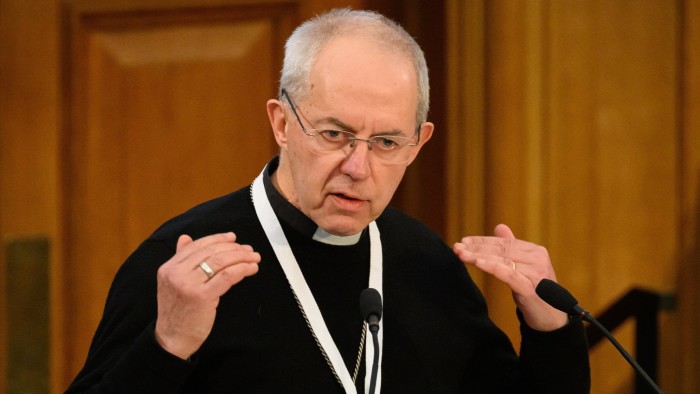Archbishop of Canterbury under pressure to resign over church abuse ‘cover-up’

Unlock the Editor’s Digest for free
Roula Khalaf, Editor of the FT, selects her favourite stories in this weekly newsletter.
The Archbishop of Canterbury Justin Welby is under growing pressure to resign over his role in the Church of England’s failure to halt the “prolific” sexual and physical attacks carried out by a child abuser associated with the church.
By Monday afternoon a petition calling on Welby to stand down started by three members of the Church of England’s ruling General Synod had garnered more than 4,500 signatures.
Earlier the Bishop of Newcastle, Helen-Ann Hartley, became the most senior member of the clergy to add her voice to those saying the archbishop’s position had become untenable.
“I think rightly people are asking the question ‘Can we really trust the Church of England to keep us safe?’ And I think the answer at the moment is ‘no’,” she told the BBC, arguing that Welby’s resignation would indicate “a line has been drawn”.
The Church Society, an evangelical group, on Monday accused the archbishop of bringing the denomination into “utter disrepute” and called on him either to give up responsibility for the safeguarding of children or resign.
“Your words can no longer be trusted and your moral standpoint is hollow,” it said.
The calls for him to quit follow a report issued last week detailing the “brutal and horrific” abuses over a 40-year period by the late John Smyth QC, who it called “arguably the most prolific serial abuser to be associated with the Church of England”.
Keith Makin’s report said the clergy “at the highest level” knew about the abuse, but failed to pursue the matter vigorously enough with the police or the relevant authorities in Cape Town.
Smyth died in the South African city in 2018 while still under investigation. Makin’s report was commissioned the following year.
Smyth’s abuse was “covered up, minimised and held as secret from at least 1982”, the report said, adding the barrister was able to continue his attacks in Africa “because of inaction of clergy within the Church of England”.
Welby attended the Iwerne Christian summer camps in Hampshire where Smyth began physically and sexually abusing boys and young men in the 1970s, and visited and made donations to similar Christian camps the barrister ran after moving to Zimbabwe in 1984.
The Makin review concluded there was no evidence Welby was aware of Smyth’s abuses at the time. But it did criticise Welby for failing to do more to ensure the abuse was stopped once he became Archbishop in 2013 and was aware of their severity.
“Justin Welby held a personal and moral responsibility to pursue this further, whatever the policies at play at the time required,” it said.
Welby issued a personal statement saying he was deeply sorry this abuse happened. Last week he told the broadcaster Channel 4 — which in 2017 exposed crimes believed to have affected more than 100 boys and young men — that he had considered resigning over the issue.
Lambeth Palace, Welby’s headquarters, on Monday issued a fresh statement saying the archbishop had “apologised profoundly both for his own failures and omissions, and for the wickedness, concealment, and abuse by the church more widely”.
The palace added: “As he has said, he had no awareness or suspicion of the allegations before he was told in 2013 — and therefore having reflected, he does not intend to resign.”
Welby has also come under fire recently from the evangelical side of the church in the past two weeks for comments he made on the Leading podcast, in which he softened his position on whether gay sex is a sin.
Some members of the clergy are concerned the archbishop’s detractors are taking advantage of the Makin report to conduct a witch-hunt.
Philip North, the bishop of Blackburn, described the report as a “deeply harrowing read” and said it raised huge issues that risked being swept aside by the clamour for Welby’s resignation.
“We say we have our house in order and then this emerges . . . here we are and it is the same two or three things,” he told the Financial Times, listing the failure over decades to disclose what Smyth had done, and the continuing “vulnerability of the church towards grooming behaviours”.
He also said he found the role of sectarianism in the cover-up of Smyth’s abuses “distressing”, adding it was “tribalism and faithfulness to particular theological traditions that leads to a culture of cover-up”.
He added: “What really matters more than the future of one Archbishop is the massive cultural issues we have to face.”
#Archbishop #Canterbury #pressure #resign #church #abuse #coverup





